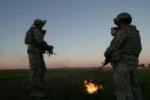KHOST PROVINCE, Afghanistan Capt. Roger Hill stood behind a long wooden desk, reading from a piece of paper that trembled lightly in his hand. "Please know that seeing your brothers whittled down one by one by a cowardly and ghost-like enemy is difficult," he said, glancing up only briefly at the team of military prosecutors assembled around him.
Hill is a U.S. Army officer in Afghanistan accused of detainee abuse, including a mock execution, war crimes, dereliction of duty and other serious charges stemming from an incident last August at a U.S. military base outside the capital city of Kabul. Members of his unit allegedly slapped Afghan detainees, and Hill himself is said to have fired his pistol into the ground near blindfolded Afghans to frighten them.
But after exploring the personalities and circumstances involved in this case, it's hard for me to condemn Hill or his first sergeant, Tommy Scott, who has been charged with assaulting the detainees. Stuck in the deadly middle ground between all-out war and nation- building, these men lashed out to protect themselves. To me, their story encapsulates the impossible role we've asked U.S. soldiers to play in the reconstruction of this devastated country. They are part warrior, part general contractor, yet they are surrounded on all sides by a populace that wants nothing more than to kill or be rid of them.








 "A Sherman can give you a very nice... edge."- Oddball,
"A Sherman can give you a very nice... edge."- Oddball, 






Bookmarks